The Hualien-Taitung Rift Valley (花東縱谷) stretches over 240km along Taiwan's southeastern coast. As well as being of immense geological interest, the valley is also culturally diverse. This region is often called "Taiwan's back garden," and there is certainly no shortage of surprises.
One of the best ways to appreciate the scenery that the area has to offer is by train, riding with the windows down. While an express train will whisk you past the many fascinating stops along the way, the Hualien-Taitung line of the Taiwan Railway Administration (台鐵) offers curious travelers a local, slower train in both the morning and evening.
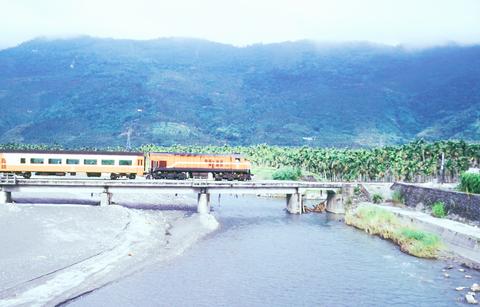
Embarking at 6:45am from Hualien on a cool, mid-Autumn Sunday morning, I found myself the only passenger in a two-carriage Kuanghua-class (光華號) local train.
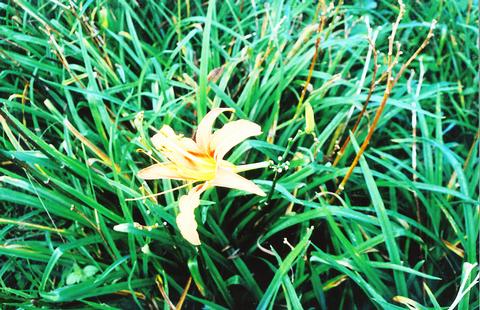
Heading south, the East Coast Mountain Range stands to your left, near and sharp. To the right, massive and imposing, looms the Central Mountain Range. Near the rails, many fields lay fallow, but bananas, papaya and late-season rice can be seen in the distance.
The Hualien-Taitung rail line seems to work in harmony with nature, following a path down a valley that was millions of years in the making. The beauty of the valley and earnestness of the people working on the line are enough to humble even a hardened traveler.
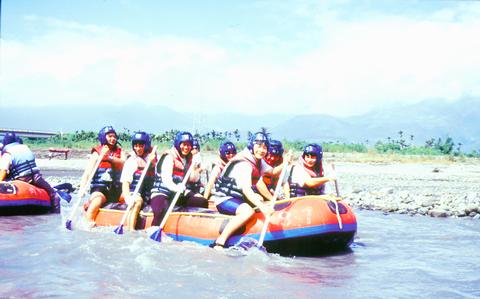
PHOTOS: GARY HEATH
Liu Chih-tian (劉進添), a train supervisor and 38-year veteran of the line, tells how maintaining the railway line is a never-ending job, with typhoons and mudslides an interminable problem throughout the valley. A look at the sheared sides of the mountains lining the railway confirm this.
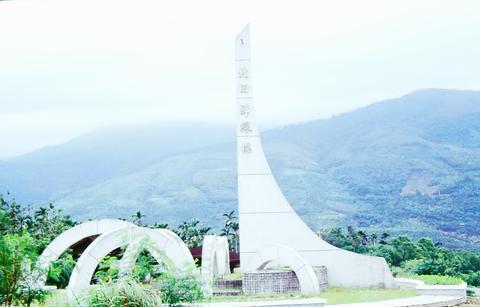
PHOTO: GARY HEATH
I bid farewell both to Liu and the engineer at Kuangfu, the first of the line's major southbound stops, and later headed on to Juisui. A thriving tourist center, Juisui is famous as a launch point for whitewater rafting on the Hsiukuluan River (
One of the more well-known of these is the Juisui hot spring. Set in a landscaped garden, it has wooden cubicles and an outdoor pool. Best of all, it has reasonably priced rooms available for travelers. Hong-yeh Hot Spring (紅葉溫泉), a more spartan establishment located nearby, offers some variety with its clear spring water.
Other Juisui highlights include the Tropic of Cancer Stone Marker, a few Stonehenge-like Aboriginal stone circles, various tea farms and the Juisui Dairy Farm (瑞穗農場). Of these, the latter two are the more interesting.
On the outskirts of Juisui is the Hehshan Leisure Tea Garden (鶴山休閒渡假茶園), an excellent place to spend time in the winter due to the area's mild climate. Here you can pick your own tea and enjoy learning all you might want to know about tea growing. You can also stay overnight at the farm.
The Juisui Dairy Farm, a fine ride by bicycle from the town center, is reminiscent of the English countryside with its cows, tractors, and green pastures, but the flocks of cranes and surrounding mountains are distinctive Taiwan markings.
The fresh milk available at the farm is also a rare treat.
But it is whitewater rafting that everyone comes to Juisui to do. This is not particularly easy if you are on your own, but after asking around, one tour company took pity on me and threw me in with a Taiwanese tour group. In no time, we were helmeted and in the river.
I wanted out of the boat after five minutes. Halfway down the Hsiukuluan, I begged off, saying I had to take some photos from the riverbank. Aimlessly floating down a potentially dangerous river with a bunch of casual tourists was not an attractive option.
The rafting aside, what makes the experience is the undeniably impressive locale. The Hsiukuluan, at 120km, is the longest river in eastern Taiwan. It is the only river to cut through the East Coast Mountain Range and provides ample opportunity to see sheer cliffs, unique flora and fauna up close and unspoiled.
Back on the train, I headed an hour south to Yuli, another slow-paced town of 30,000, where I booked a motel room and borrowed a bike to ride out to the hot spring at Antung. The springs, reached by a challenging one-hour bike ride, are clear enough to drink and are famous for their healing properties.
Splendid vistas make stopping at Yuli a treat. Mountains on both sides of the valley can be explored by bicycle, car or on foot. Whatever your mode of transport, you are bound to find an adventure.
On a fantastically fine morning, Chang Cheng-lang (
Though the farm is a mere five hectares, Chang, with the help of his wife and son, eke out a good living by growing and selling the famous chin cheng hua (
After surveying the hills and trees, I was invited to sample the flower, first deep-fried, then stir-fried and finally in a soup. They tasted a bit like eggplant but only made me hungry for the excellent locally grown watermelon, corn and pomelo.
I enjoyed the afternoon train ride from Yuli as rain showers glazed the rice fields surrounding Fuli. The train crossed the valley over a nearly dry riverbed, and crept down to Chihshang, a tiny town famous for its rice.
Another short jaunt down the line brings you to Kuanshan, the last main station before Taitung. At Kuanshan, hiring a bicycle to tour the local countryside is popular with tourists and there are plenty of places to rent one near the station. There is also a cycling park near the railway.
Good weather had held for most of my trip, but the rain finally caught up with me and I made a beeline for the station to take the next express train back to Hualien. Taitung could wait for another day.
For those interested in exploring the valley, three kinds of trains leave Hualien for Taitung on a daily basis; local, semi-express and express class. All trains stop at Kuangfu, Fenglin, Yuli, Fuli, Chihshang, Kuanshan and Taitung New Station. There are also two local trains departing Hualien for Yuli each day in the morning and afternoon. Check with the Taiwan Railway Administration for the latest schedule.
Reasonably priced accommodation can be found at any motel near a railway station along the line. Accommodation is also available at most hot spring resorts or leisure farms. Those listed below all have rooms for around NT$1,000 per night.
Several companies run whitewater rafting trips in Juisui. If you want to go whitewater rafting, getting together a group of at least four people is advisable. Whitewater rafting is most popular in the peak summer season, but the companies run trips year round. Cost is a minimum NT$750 per person.

Feb. 17 to Feb. 23 “Japanese city is bombed,” screamed the banner in bold capital letters spanning the front page of the US daily New Castle News on Feb. 24, 1938. This was big news across the globe, as Japan had not been bombarded since Western forces attacked Shimonoseki in 1864. “Numerous Japanese citizens were killed and injured today when eight Chinese planes bombed Taihoku, capital of Formosa, and other nearby cities in the first Chinese air raid anywhere in the Japanese empire,” the subhead clarified. The target was the Matsuyama Airfield (today’s Songshan Airport in Taipei), which
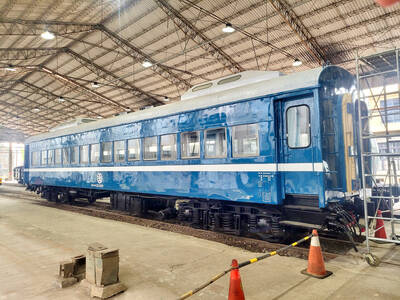
For decades, Taiwan Railway trains were built and serviced at the Taipei Railway Workshop, originally built on a flat piece of land far from the city center. As the city grew up around it, however, space became limited, flooding became more commonplace and the noise and air pollution from the workshop started to affect more and more people. Between 2011 and 2013, the workshop was moved to Taoyuan and the Taipei location was retired. Work on preserving this cultural asset began immediately and we now have a unique opportunity to see the birth of a museum. The Preparatory Office of National

China has begun recruiting for a planetary defense force after risk assessments determined that an asteroid could conceivably hit Earth in 2032. Job ads posted online by China’s State Administration of Science, Technology and Industry for National Defence (SASTIND) this week, sought young loyal graduates focused on aerospace engineering, international cooperation and asteroid detection. The recruitment drive comes amid increasing focus on an asteroid with a low — but growing — likelihood of hitting earth in seven years. The 2024 YR4 asteroid is at the top of the European and US space agencies’ risk lists, and last week analysts increased their probability

On Jan. 17, Beijing announced that it would allow residents of Shanghai and Fujian Province to visit Taiwan. The two sides are still working out the details. President William Lai (賴清德) has been promoting cross-strait tourism, perhaps to soften the People’s Republic of China’s (PRC) attitudes, perhaps as a sop to international and local opinion leaders. Likely the latter, since many observers understand that the twin drivers of cross-strait tourism — the belief that Chinese tourists will bring money into Taiwan, and the belief that tourism will create better relations — are both false. CHINESE TOURISM PIPE DREAM Back in July